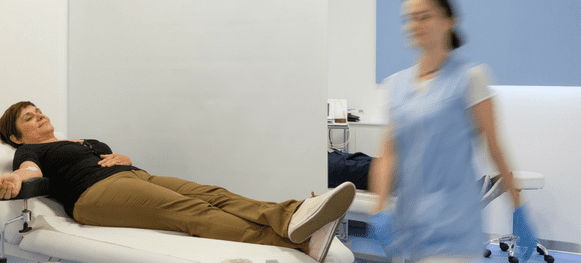
More than 3 million people in Spain suffer from an autoimmune disease, most of them women. These chronic diseases require constant medication with no apparent hope of a cure, but there are therapies such as Immunotherapy, which can change this.
The tolerogenic immunotherapy stimulates and regulates the proper functioning of the body's natural defences, the immune system, returning it to its normal level of tolerance. When we talk about immunotherapy for autoimmune diseases, we are referring to a kind of treatment that "re-educates" the patient's lymphocytes to regain their antigen-detecting and antigen-destroying function.
Nowadays, there are very advanced therapies such as the therapeutic apheresis which helps the patient to reduce symptoms, among other benefits.
What is an autoimmune disease?
An autoimmune disease is triggered because lymphocytes consider normal cells in our body to be dangerous, foreign or harmful and progressively attack and destroy them, triggering the disease. This twist in lymphocyte function is caused by genetic and environmental factors that decrease the tolerance level of the immune system, until The point of recognising certain structures of the organism as foreign. Depending on the tissue under attack, it is one or the other autoimmune disease.
At Biosalud Day Hospital, we have been specialists in the treatment of autoimmune diseases for more than 33 years. Our approach from with the Biological Medicine makes us look for the causes of the disease, those triggers of the autoimmune process, and to design personalised treatments for its cure or control. One of the important aspects of these treatments is the regulation of the organism, previously eliminating all the environmental factors (intolerant diet, toxic chemicals, concomitant chronic intestinal or systemic infections, heavy metals, moulds, etc.).
Now, With Immunotherapy research, we want to go a step further in the treatment of these diseases, offering greater chances of cure to our patients.
One of the lines of work that we are researching is the Tolerogenic Immunotherapy, a personalised treatment made from the patient's own autologous dendritic cells thatinstead of immunosuppressing lymphocytes (as conventional medicine does), it regulates them..
This biological therapy uses the patient's own dendritic cells, once programmed in the laboratory, through its exosomes, induce tolerance to lymphocytes. The application of this therapeutic vaccine, fully autologous and personalised, does not offer any rejection by the patient. In addition, it provides the lymphocytes with their "memory" function, so that curing the disease is also prevention for the future.
It is important to know that this treatment has proven effective in "stopping" the autoimmune process. and prevent the development of other autoimmune diseases later on. Nowadays, it is increasingly common for a patient on immunosuppressive treatment to develop three or more autoimmune diseases, in addition to suffering the side effects of this suppressive treatment.
Why are dendritic cells important in this therapy?
Lymphocytes are responsible for attacking and eliminating antigens (foreign substances, pathogenic germs, etc.) that enter the body, and are formed in the so-called lymphoid tissues (tonsils, lymph nodes, spleen or thymus), while dendritic cells are considered the "pacemakers" of the immune system and are what initiate, direct and regulate the immune system's response. They are also called "antigen-presenting cells" and are effectively the cells that tell the lymphocytes who the "enemies" are and who to attack. In the process of immunotherapy treatment, these cells undergo a process of "molecular maturation and programming".
The dendritic cells are extracted from the patient's own blood.by extraction or selective apheresis.
From these, and by means of various laboratory procedures of Molecular Biology, their exosomes, which are vesicles with which the cells actually exert their action, are extracted. If we talk about tolerogenic dendritic cells, we will have tolerogenic exosomes.
When working in the cancer with immunogenic dendritic cellsIn this case, we are talking about immunogenic exosomes.
In the case of stem cells mesenchymal stem cells from the stromal vascular fraction of adipose tissue, we then obtain regenerative exosomes, which are more than 50 times more effective than stem cells alone.


6 thoughts on “Inmunoterapia y enfermedades autoinmunes”
What is the health condition of the patient, what is his or her relationship to other diseases, what is the profile of the candidate for this healing system?
Maria, good morning. Biosalud Day Hospital treatments are personalised and are designed after analysis of the medical history and the tests we carry out. These tests are precisely what indicate the suitability of each patient to receive the treatment but, a priori, there are no contraindications. greetings
I would like to know if you have any insurance or how much the treatment costs approximately.
Mª Isabel, at Biosalud we do not have private insurance. As for the budget, we can tell you that our treatments are personalised and we cannot make an estimate without knowing the case. The clinic will give you more detailed information by email. Thank you
Hello:
I would like to know if this immunotherapy treatment has a chance of relieving psoriasis and psoriatic arthritis.
My 21 year old son suffers from it, he has been on a special diet and supplements for more than two years, with no results so far, he has also received 10 sessions of ozone dose cans with no results either. We do not want to give him medication and we have seen this treatment.
I would appreciate a reply
Greetings
Alazne
Good morning. This article is informative and in no case should replace a medical opinion, which is the one that can develop a treatment plan with the appropriate tests and medical history. At Biosalud we do not develop these immunotherapy treatments but we have been treating autoimmune diseases since 1985. If you wish, you can contact us on 91 088 6292 and consult our Patient Care Department. Best regards
Comments are closed.